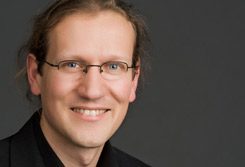Academic Writing Skills
Critical Argumentation in Seminar Papers

Foreign students, in particular, face a special challenge when they have to produce an academic paper in German, explains Martin Steinseifer, coordinator of the research project entitled “Eristische Literatur” (Eristic Literacy) at the Justus Liebig University in Giessen.
Mr Steinseifer, why does your research project on German as an academic language bear the title “Eristic Literacy”?
In Greek “eris” means dispute, controversy. The term eristic is based on the idea that academic texts, in particular texts related to the humanities or cultural science, distinguish themselves by orienting themselves towards dispute and controversy – in their texts scientists deal with the different positions propounded by research, by either agreeing with them or dissociating themselves from them, in order to arrive at new conclusions. Eristic text competency is thus the ability to present contradictory positions in written form and, at the same time, to use them to help process one’s own problem.
Is this orientation towards dispute typical of German academic culture?
No, it is not found solely in the realm of German academia. One characteristic feature, however, is that students in Germany are actually expected to produce it in their papers, i.e. in their research and seminar papers. Students are given the task of writing a mini-research paper, in which they are expected to act like established scientists and to express themselves correspondingly. It is exactly this that makes academic writing so difficult for many students.
Writing seminar papers is a real challenge
Have German and foreign students been prepared in different ways when it comes to mastering this type of academic discourse?German students, when starting their course of study, maybe have a few advantages, because in school they have had a lot of experience discussing issues – at least orally, whereas school and university traditions in other countries do not focus on dealing critically with knowledge bases in the same way. Nevertheless writing a seminar paper is still a new challenge for all first-semester students. In German schools, however, pupils, when writing a paper, are still above all required to summarise texts, to compile tables of contents and analyse literary works, instead of arguing in written form. German first-semester students – like their foreign counterparts – often have a different understanding of academic culture. As a rule they assume that in the realm of science and academia the aim is to discover truths and not to present convictions by comparing one’s own answers to a question with others and supporting it with good arguments
What are the linguistic challenges foreign students have to overcome when producing an academic paper?
Familiarity with specialist vocabulary and the fact that academic texts have to be studded with longer and complicated sentences is not – as one might assume – such a huge problem for the foreign students. It is, however, an additional challenge for foreign students that they have not been through the same native-speaker experience. That is why they find it difficult to pick out the typical native-speaker features of a German text and then use them to their advantage. A good example of this would be quotes; foreign students tend over and over again to present statements without characterising them properly – they do not make it clear that it is a quote – or they characterise them in a very vague way. What other people have presented as facts are presented by them as their facts. In cases like this the reference to research discourse is missing and this is usually found in such formulations as “Author A argues that …., author B assumes on the basis of the theory that …”. This, however, also occurs among German students who have in fact learned about the different styles of discourse in school, but not about their function in academic writing.
Collective thinking is particularly effective among foreign students
What possibilities are available to help foreign students develop their skills in German academic language?For a long time students at the universities were simply required to read texts that would serve as models for their own writing. If, however, progress is to be made in a relatively short period of time, it is equally important to make sure students are aware of the functions certain linguistic devices have, and how they should be used. In the meantime there are many writing centres that offer special courses for students with German as a second language or individual writing consultants who provide students with feedback on their text writing skills. From our point of view it is decisive that we support the transition from reading to writing.
How can this be achieved?
At the University of Giessen we have set up a centre for “controversial writing” that goes by the name of Skola (Schreibkontroversenlabor). It is a web-based learning environment in which the students make notes in the margin of a text and then, as the next step, restructure them anew in general categories, in order to help them to write a new text. We then integrate this in our lectures, in order to be able to speak to the students about the different steps in the working process that are required when writing an academic paper. When it comes to the learning process, this collective thinking approach is particularly effective among foreign students. When typical linguistic devices are pointed out to them, for example, those used when quoting, they then make use of them in their text. This does not make the texts perfect, but they immediately do take on a more academic character. The discussions then accordingly trigger promising acquisition processes in the students.
 Dr. Martin Steinseifer
| © Martin Steinseifer
Dr. Martin Steinseifer studied German language and literature and protestant theology. From August 2012 until March 2015 he worked as a research associate on the project entitled Eristische Literalität (eristic literacy) at the Justus Liebig University in Giessen, which he has since been coordinating. Sponsored by the Volkswagen Foundation, the project, under the management of Prof. Helmuth Feilke and Prof. Katrin Lehnen, examines the acquisition and the possibilities of promoting text skills for students from different linguistic backgrounds and academic cultures, who have to write their papers in academic German.
Dr. Martin Steinseifer
| © Martin Steinseifer
Dr. Martin Steinseifer studied German language and literature and protestant theology. From August 2012 until March 2015 he worked as a research associate on the project entitled Eristische Literalität (eristic literacy) at the Justus Liebig University in Giessen, which he has since been coordinating. Sponsored by the Volkswagen Foundation, the project, under the management of Prof. Helmuth Feilke and Prof. Katrin Lehnen, examines the acquisition and the possibilities of promoting text skills for students from different linguistic backgrounds and academic cultures, who have to write their papers in academic German.